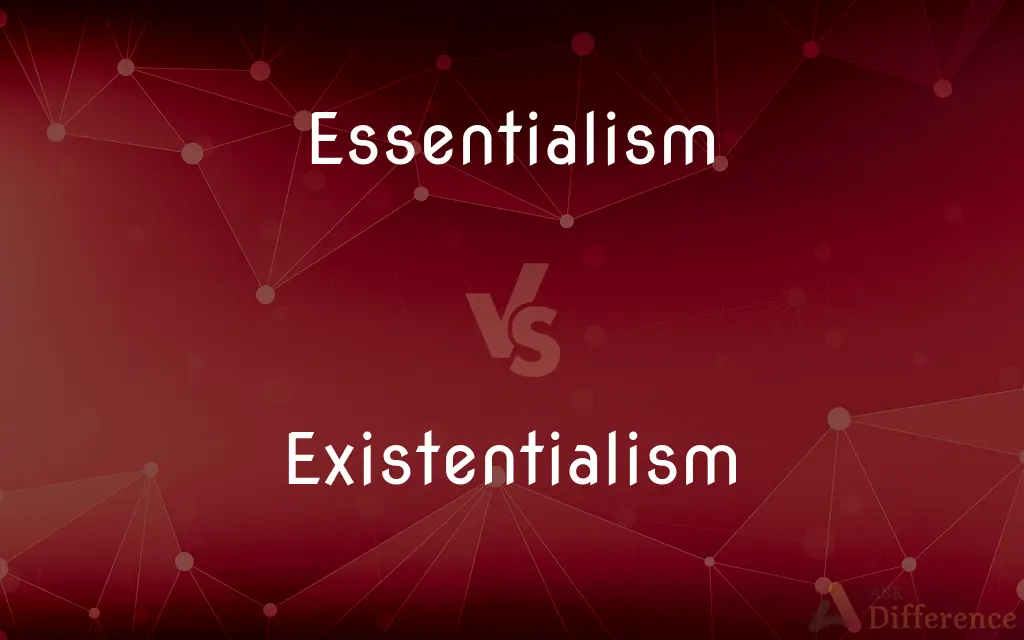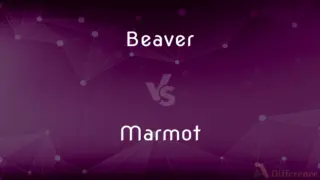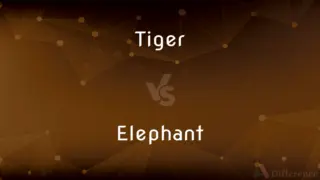Essentialism vs. Existentialism — What's the Difference?
By Fiza Rafique & Urooj Arif — Updated on March 26, 2024
Essentialism argues for inherent essence defining entities, especially humans, while existentialism posits existence precedes essence, emphasizing individual freedom and choice.

Difference Between Essentialism and Existentialism
Table of Contents
ADVERTISEMENT
Key Differences
Essentialism is grounded in the belief that things have an inherent set of characteristics that make them what they are. This perspective often applies to living entities, suggesting that their nature, purpose, and function are predefined. On the other hand, existentialism challenges this notion by asserting that individuals first exist without any predetermined essence or purpose, and it is through their interactions and choices that they define themselves.
While essentialism tends to emphasize the universality of certain traits among entities or beings, suggesting a sort of universal truth or nature to things, existentialism places a high value on individual experience and personal choice. It argues that the essence of a person or object is not fixed but is continually being formed through life's experiences.
In the realm of human existence, essentialism might argue that one's identity, roles, and values are largely determined by innate factors or the essence of humanity itself. Conversely, existentialism posits that individuals are free to create their own identities and values, making choices that define their essence over time, free from the constraints of universal truths.
Educationally, essentialism can manifest in a structured curriculum focused on transmitting a core body of knowledge believed to be essential for the intellectual development of the individual. Whereas, existentialism would support a more flexible, student-centered approach, emphasizing personal growth through freedom of choice and exploration of one's own interests and desires.
Philosophically, essentialism often aligns with more deterministic views, where the nature or essence of things predetermines their outcomes. Existentialism, however, aligns with a philosophy of freedom, arguing that despite the randomness of the universe or the absence of inherent meaning, individuals have the power to confer meaning onto their lives and make significant choices.
ADVERTISEMENT
Comparison Chart
Core Belief
Inherent essence defines beings.
Existence precedes essence.
Emphasis
Universality and predetermined nature.
Individual freedom and choice.
Human Nature
Predetermined by essence.
Defined by actions and choices.
Educational Philosophy
Structured, core knowledge focus.
Flexible, student-centered.
Philosophical Alignment
Determinism.
Freedom and subjectivity.
Compare with Definitions
Essentialism
It implies predetermined roles and identities
Essentialism may argue that being a caregiver is inherent in being a parent.
Existentialism
Existentialism argues existence precedes essence
Existentialism believes you are born a blank slate, and life experiences shape you.
Essentialism
Essentialism posits that entities have an intrinsic nature
Essentialism suggests that a tiger's aggression is part of its essence.
Existentialism
Reflected in flexible, student-centered education
Existentialism encourages exploring personal interests in learning.
Essentialism
Seen in educational curriculums focusing on core knowledge
Essentialism backs a curriculum centered around traditional subjects like math and history.
Existentialism
Emphasizes individual choice and freedom
Existentialism supports the idea that you choose your own path in life.
Essentialism
Emphasizes universal truths across entities
Essentialism finds commonalities in human nature across cultures.
Existentialism
Values personal experience over universal truths
Existentialism finds meaning in personal experiences rather than inherent truths.
Essentialism
Often associated with natural and social order
Essentialism supports the idea of natural hierarchies in society.
Existentialism
Associated with the freedom to create one's identity
Existentialism advocates for self-definition and personal growth.
Essentialism
Essentialism is the view that objects have a set of attributes that are necessary to their identity. In early Western thought, Plato's idealism held that all things have such an "essence"—an "idea" or "form".
Existentialism
Existentialism ( or ) is a form of philosophical inquiry that explores the problem of human existence and centers on the experience of thinking, feeling, and acting. In the view of the existentialist, the individual's starting point has been called "the existential angst," a sense of dread, disorientation, confusion, or anxiety in the face of an apparently meaningless or absurd world.
Essentialism
The philosophical tenet that objects and classes of objects have essential and not merely accidental characteristics.
Existentialism
A philosophy that emphasizes the uniqueness and isolation of the individual experience in a hostile or indifferent universe, regards human existence as unexplainable, and stresses freedom of choice and responsibility for the consequences of one's acts.
Essentialism
(philosophy) The view that objects have properties that are essential to them.
Existentialism
A twentieth-century philosophical movement emphasizing the uniqueness of each human existence in freely making its self-defining choices.
The heyday of existentialism occurred in the mid-twentieth century.
Essentialism
(education) The doctrine that there are certain traditional concepts, values, and skills that are essential to society and should be taught to all students.
Existentialism
The philosophical views of a particular thinker associated with the existentialist movement.
Sartre's existentialism is atheistic, but the existentialism of Marcel is distinctly Christian.
Essentialism
A lifestyle that seeks to minimize nonessentials in order to focus on what is important.
Existentialism
A philosophical theory or attitude having various interpretations, generally emphasising the existence of the individual as a unique agent with free will and responsibility for his or her own acts, though living in a universe devoid of any certain knowledge of right and wrong; from one's plight as a free agent with uncertain guidelines may arise feelings of anguish. Existentialism is concerned more with concrete existence rather than abstract theories of essences; is contrasted with rationalism and empiricism; and is associated with Kierkegaard, Heidegger and Sartre, as well as others.
Essentialism
(philosophy) The theory that human beings are by nature (i.e. essentially) good and that evil is the product of society.
Existentialism
(philosophy) a 20th-century philosophical movement; assumes that people are entirely free and thus responsible for what they make of themselves
Common Curiosities
What is the main difference between essentialism and existentialism?
Essentialism believes in a predefined essence for entities, while existentialism posits that existence comes first and essence is defined through individual choices.
How do essentialism and existentialism view human nature?
Essentialism sees human nature as predetermined, while existentialism believes it's shaped by personal choices and experiences.
Can essentialism and existentialism coexist in one's philosophy?
While they offer contrasting views, some integrate both to navigate between determinism and freedom of choice, acknowledging innate tendencies while embracing the capacity for change.
What role does freedom play in existentialism?
Freedom is central to existentialism, emphasizing the individual's power to define their essence through choices, against essentialism’s notion of a fixed nature.
Is existentialism more optimistic than essentialism?
Existentialism is often seen as more empowering, offering optimism through the belief in personal agency and the ability to shape one's destiny, in contrast to essentialism's more deterministic outlook.
How do educational philosophies differ under essentialism and existentialism?
Essentialism advocates for a structured curriculum focusing on core knowledge, whereas existentialism promotes a flexible, student-centered approach, allowing learners to explore their interests.
Can existentialism lead to a sense of responsibility?
Yes, existentialism inherently involves a sense of responsibility, as it places the onus on individuals to create meaning and purpose in their lives through their choices.
How do essentialism and existentialism differ in their view of destiny?
Essentialism might imply a fixed destiny based on one's essence, whereas existentialism believes in creating one's destiny through choices and actions.
How do essentialism and existentialism influence personal development?
Essentialism may limit personal development by confining individuals to predefined paths, while existentialism encourages growth through exploration and choice.
How does essentialism impact societal views on roles and identities?
Essentialism can reinforce traditional roles and identities by suggesting they are inherent and unchangeable, unlike existentialism which promotes individual freedom in defining roles.
What implications do essentialism and existentialism have on ethics?
Essentialism might lean towards absolute moral codes based on human essence, whereas existentialism suggests ethics are subjective, shaped by individual choice and context.
Does existentialism deny all forms of essence or nature?
Not entirely; existentialism doesn't deny the existence of certain natural inclinations but argues that essence is ultimately defined through personal choices and actions.
What impact does essentialism have on education?
Essentialism impacts education by promoting a standardized curriculum aimed at imparting a foundational body of knowledge, in contrast to existentialism's emphasis on personalizing education to fit individual learners' interests and needs.
Does existentialism offer a clear path to finding meaning in life?
Existentialism offers no clear path but empowers individuals to find their own meaning and purpose through lived experiences and personal values.
How do essentialism and existentialism approach the concept of identity?
Essentialism views identity as largely fixed and defined by inherent traits, while existentialism sees identity as fluid, crafted through experiences and choices.
Share Your Discovery

Previous Comparison
Beaver vs. Marmot
Next Comparison
Tiger vs. ElephantAuthor Spotlight
Written by
Fiza RafiqueFiza Rafique is a skilled content writer at AskDifference.com, where she meticulously refines and enhances written pieces. Drawing from her vast editorial expertise, Fiza ensures clarity, accuracy, and precision in every article. Passionate about language, she continually seeks to elevate the quality of content for readers worldwide.
Co-written by
Urooj ArifUrooj is a skilled content writer at Ask Difference, known for her exceptional ability to simplify complex topics into engaging and informative content. With a passion for research and a flair for clear, concise writing, she consistently delivers articles that resonate with our diverse audience.














































